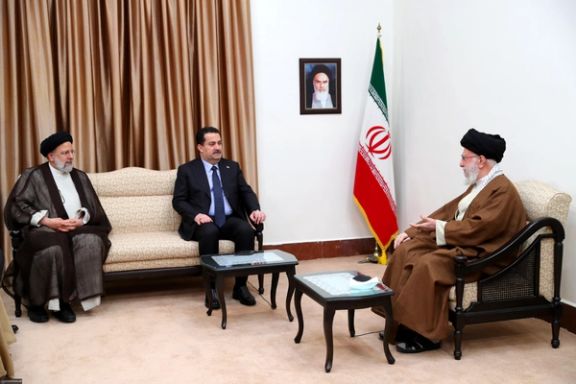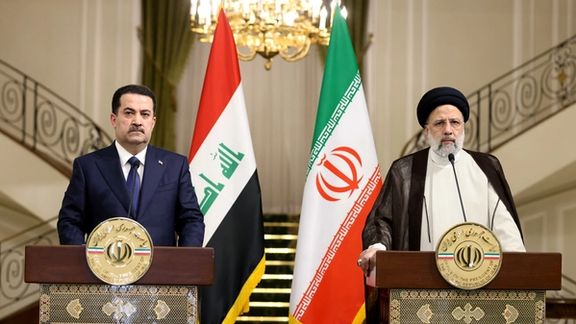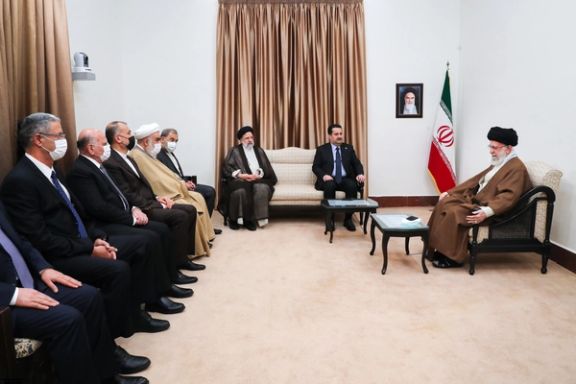Islamic Republic Admits Failure Of Trade Deals With Iraq

Supreme Leader Ali Khamenei has stressed the need to implement agreements signed between Iran and Iraq, admitting that most of such deals were never implemented.

Supreme Leader Ali Khamenei has stressed the need to implement agreements signed between Iran and Iraq, admitting that most of such deals were never implemented.
During a meeting with visiting Iraqi Prime Minister Mohammed Shia' al-Sudani in the capital Tehran Tuesday, Khamenei said numerous deals or memorandums were inked between Tehran and Baghdad, but they were rarely implemented. He especially called for moving towards action on projects in the fields of trade cooperation, transit of commodities and railroad transport.
The Islamic Republic is known to have announced signing deals and contracts whenever officials from other countries visit but most of such announcements are never followed up or result in any tangible operations. Many figures are usually announced but when scrutinized they turn out to be fake or mere estimations.
On Wednesday, board director of the Iranian Oil, Gas and Petrochemical Products Exporters’ Association, Hamid Hosseini, announced Tehran and Baghdad have concluded a $4 billion contract in the field of exporting technical and engineering services. However, the official added that “In the eight months of this year [beginning on March 20], exports to Iraq, except for electricity, totaled $4.7 billion, down by $1.4 billion compared to the same period last year.” It is expected that Iran exports to Iraq will reach $8-9 billion, Hosseini claimed, in the remaining four months.
Iraq has been Iran’s second largest trading partner after China, importing natural gas, but US banking sanctions on the Islamic Republic have made it difficult for Tehran to receive payments. Every now and then, the Islamic Republic claims that it has received its funds from Iraq. Payments for Iran’s gas and electricity imports by Iraq go to a special account in the state-owned Trade Bank of Iraq. Iran can only use the money for humanitarian commodities. The amount of money frozen in Iraq banks was over $6 billion in September, most probably the amount has grown since then.

The Iranian Oil Ministry also announced Tuesday that it has opened an office in Iraq. Oil Ministry’s special envoy to Iraq Seyyed Abbas Beheshti said that the mission will help facilitate the implementation of joint energy projects between Iran and Iraq. “This office was opened in the city of Baghdad for the purpose of promoting cooperation and synergy, especially in the implementation of joint oil, gas and energy projects between the two brotherly countries,” he added. Two other Iranian Oil Ministry missions will also open in oil-rich regions of Basra in the south and in the semi-autonomous region of Kurdistan in northern Iraq, he said.
According to a recent article by a newspaper in Tehran, Iran has lost $450 billion in oil revenues in a decade because of international and US sanctions. Aftab News website based its calculation of lost revenues on OPEC’s annual oil export numbers and estimated that UN Security Council sanctions that came into play a decade ago and lasted more than 3 years, followed by US sanctions since 2018 cost Iran dearly.
President Ebrahim Raisi and his oil minister claim that Iran has increased oil output and exports to pre-2018 levels when former US president Donald Trump withdrew from the 2015 nuclear deal with Iran and began imposing sanctions on Iranian oil exports.
Iraq’s oil ministry said earlier in the year that it exported $11 billion of oil in March, the highest level for half a century, as crude prices soared in the wake of Russia’s invasion of Ukraine. Iraq’s record shipment of crude caught the attention of several Iranian pundits who drew attention on social media to Baghdad’s success, while Iran is still hampered by United States sanctions. The ministry said that the country exported "100,563,999 barrels for revenues of $11.07 billion, the highest revenue since 1972". This makes Iraq’s daily shipments three times more than Iran’s clandestine exports.

Al-Sudani's accompanying delegation includes Foreign Minister Fuad Hussein, veteran oil minister Hayan Abdulghani and Qasim al-Araji, a former interior minister and current national security adviser. This is the first visit by the new premier, who assumed office late in October. The visiting Iraqi officials held several meetings Tuesday, including with President Ebrahim Raisi. Al-Sudani and his delegation traveled to the religious city of Mashhad Wednesday.
The new prime minister has already visited to Jordan and Kuwait and is set to visit Saudi Arabia later in December. His visit to Iran was aimed at consolidating Baghdad’s ties with Tehran.
In September, the head of Iran-Iraq Joint Chamber of Commerce, Jahanbakhsh Sanjabi Shirazi revealed that contrary to the government's claim, Iran's exports to Iraq have decreased in the past five months, 8 percent in terms of value and 28 percent in terms of weight.